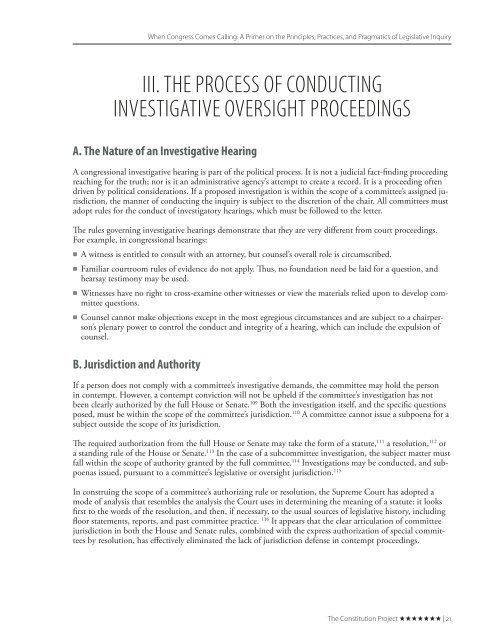When Congress Comes Calling
WhenCongressComesCalling
WhenCongressComesCalling
You also want an ePaper? Increase the reach of your titles
YUMPU automatically turns print PDFs into web optimized ePapers that Google loves.
<strong>When</strong> <strong>Congress</strong> <strong>Comes</strong> <strong>Calling</strong>: A Primer on the Principles, Practices, and Pragmatics of Legislative Inquiry<br />
III. The Process of Conducting<br />
Investigative Oversight Proceedings<br />
A. The Nature of an Investigative Hearing<br />
A congressional investigative hearing is part of the political process. It is not a judicial fact-finding proceeding<br />
reaching for the truth; nor is it an administrative agency’s attempt to create a record. It is a proceeding often<br />
driven by political considerations. If a proposed investigation is within the scope of a committee’s assigned jurisdiction,<br />
the manner of conducting the inquiry is subject to the discretion of the chair. All committees must<br />
adopt rules for the conduct of investigatory hearings, which must be followed to the letter.<br />
The rules governing investigative hearings demonstrate that they are very different from court proceedings.<br />
For example, in congressional hearings:<br />
33 A witness is entitled to consult with an attorney, but counsel’s overall role is circumscribed.<br />
33 Familiar courtroom rules of evidence do not apply. Thus, no foundation need be laid for a question, and<br />
hearsay testimony may be used.<br />
33 Witnesses have no right to cross-examine other witnesses or view the materials relied upon to develop committee<br />
questions.<br />
33 Counsel cannot make objections except in the most egregious circumstances and are subject to a chairperson’s<br />
plenary power to control the conduct and integrity of a hearing, which can include the expulsion of<br />
counsel.<br />
B. Jurisdiction and Authority<br />
If a person does not comply with a committee’s investigative demands, the committee may hold the person<br />
in contempt. However, a contempt conviction will not be upheld if the committee’s investigation has not<br />
been clearly authorized by the full House or Senate. 109 Both the investigation itself, and the specific questions<br />
posed, must be within the scope of the committee’s jurisdiction. 110 A committee cannot issue a subpoena for a<br />
subject outside the scope of its jurisdiction.<br />
The required authorization from the full House or Senate may take the form of a statute, 111 a resolution, 112 or<br />
a standing rule of the House or Senate. 113 In the case of a subcommittee investigation, the subject matter must<br />
fall within the scope of authority granted by the full committee. 114 Investigations may be conducted, and subpoenas<br />
issued, pursuant to a committee’s legislative or oversight jurisdiction. 115<br />
In construing the scope of a committee’s authorizing rule or resolution, the Supreme Court has adopted a<br />
mode of analysis that resembles the analysis the Court uses in determining the meaning of a statute: it looks<br />
first to the words of the resolution, and then, if necessary, to the usual sources of legislative history, including<br />
floor statements, reports, and past committee practice. 116 It appears that the clear articulation of committee<br />
jurisdiction in both the House and Senate rules, combined with the express authorization of special committees<br />
by resolution, has effectively eliminated the lack of jurisdiction defense in contempt proceedings.<br />
The Constitution Project | 21


